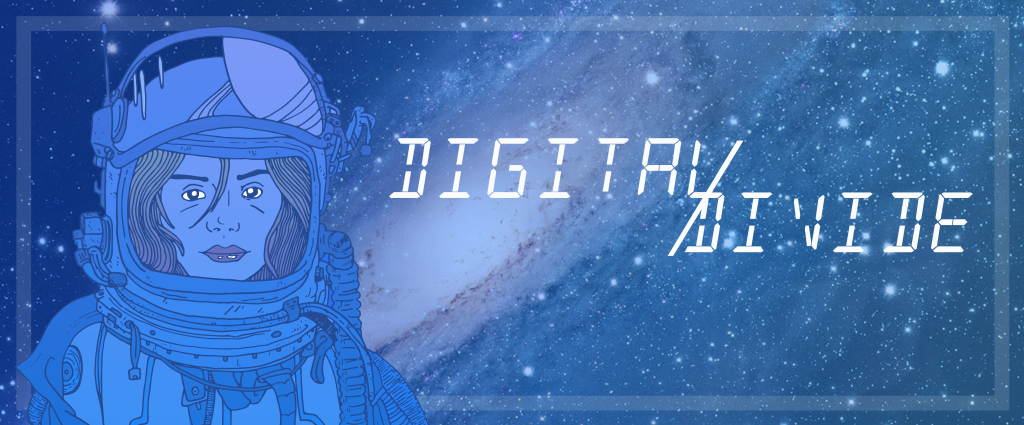
Digital/Divide is een maandelijkse column gewijd aan alle genres en subgenres in de grote mooie wereld van elektronische en dansmuziek.

Buiten de Harlem Shake zijn er in recente herinnering weinig grotere culturele overnames geweest dan die van dubstep. Hoewel het natuurlijk niet gelijk staat aan daadwerkelijke terrorisme, heeft de agressieve shock-en-vruchtbare overname van een ooit veelbelovende opkomende clubgenre door opportunistische arena-kwelgeesten onherstelbare schade aan de geloofwaardigheid aangericht. Wegwerp tieners verzamelden zich in massa om te genieten van een geluid dat ontdaan was van betekenis, substantie en subtiliteit. En terwijl Skrillex een respectabelere naam voor zichzelf heeft gemaakt sinds hij die uitgedroogde schulp van een genre heeft ingeruild voor een bredere pop-EDM-aanpak, heeft dat de minder commercieel ingestelde types en idealistische grondleggers van de scene gedwongen ofwel puin te verzamelen uit het wrak—zoals drum 'n bass bewonderenswaardig deed—of om nieuw terrein te verkennen.
De jury is nog steeds uit of dubstep ooit weer zijn voet aan de grond zal vinden, vooral met de toenemende concurrentie voor dansvloer ruimte. Toch heeft een van zijn pioniers tenminste een manier vooruit gevonden. Bekend bij oude garde als de helft van de Digital Mystikz, UK-producer Mala gebruikt zijn DMZ-vaardigheden om iets te creëren dat niet wordt belast door de beperkingen van genre op Mirrors [Brownswood]. Zijn duidelijke liefde voor low-end rammel en heldere percussie heeft hem hierheen geleid, naar deze onopgemerkte plaatsen van "Dedicated 365" en de frenetic "4 Elements."
Er is niets vreemds aan de nieuwe Mala. Zijn tijd in Latijns-Amerika, goed gedocumenteerd op zijn opmerkelijke 2012 hiaat Mala In Cuba, sijpelt binnen in "The Calling" en de rechttoe rechtaan ballade son van "Cunumicita." Met een knipoog naar de woestijnscene van Mirrors' albumcover, zoemt "Shadows" met een Midden-Oosterse ondertoon die niet geheel ongewoon is voor selecties uit de Muslimgauze discografie. Hij vult zelfs een paar van deze auditieve landschapen met vocale bijdragen hier en daar, misschien het beste geïllustreerd door de extatische zang van de Peruviaanse artiest Sylvia Falcon op “Sound Of The River.” Hoewel het moeilijk zal zijn voor anderen die zich ontredderd voelen in de afwezigheid van dubstep om in de voetsporen van Mala te treden, is er zeker geen kwaad in het proberen.
Toen Richard D. James zijn grote terugkeer maakte met 2014’s Syro, was het een evenement. Zeer weinig artiesten in de elektronische muziek hebben de soort macht en invloed om hun releases als dusdanig behandeld te krijgen, en niemand meer dan Aphex Twin. De onverwachte aankondiging van Cheetah, zijn laatste effort in EP-formaat na het vorig jaar’s Pierre Bastien-achtige Computer Controlled Acoustic Instruments pt2, dient ook als een herinnering dat James ooit een van de meest productieve muzikanten was. En gezien de incestueuze titels van deze linksse dansvloerplankjes, is de kans groot dat hij dat nog steeds is. Ondanks de grote kans dat hij genoeg Cheetah-varianten en thematische broers en zussen heeft om een of twee albums te vullen, bieden de zeven onderling verbonden selecties hier een aanzienlijke blik op zijn post-rave geestestoestand. De spookachtige nachtelijke dreun en grind van “CHEETAHT2 [Ld spectrum]” glijdt over in de geventileerde acid house shuffle van “CHEETAHT7b.” Met zijn album- en tracknamen hier als knipoog naar synth-geeks, levert James’ dansvloer-sandboxing alles van de korte uitbarstingen van “CHEETA1b ms800” en “CHEETA2 ms800” tot de druppige dromen van “CIRKLON3 (Kolkhoznaya mix),” het laatste teruggrijpend naar 1993’s onberispelijke On EP.

Degenen die niet bekend zijn met la cumbia peruana of dat land’s unieke rol in de bloei van het genre hoeven zich geen zorgen te maken wanneer ze deze progressieve herinterpretatie en herappropriatie van dit Lima-duo benaderen. Breder bekeken, bestaan Dengue Dengue Dengue comfortabel in het grote geheel van hedendaagse elektronische muziek, onmiskenbaar onderdeel van hetzelfde mondiale netwerk dat Durban verbindt met Lissabon naar Londen enzovoort. Wanneer ze niet overduidelijk Latijnse tropen aanpassen, pikken ze hun hybride stijl royaal uit Caribische geluiden om een bevredigende wereldse beat te maken, of dat nu de ingekorte dancehall neef “Badman” is of de knipoog naar Lee Perry op “Dubcharaca.” Gejuxtaponeerd met dubwise-trekjes, injecteert het felle tempo van “Murdah” nieuw bloed in de bass muziek, die slechts kort halverwege in een halfstep-refrein valt. Het hypnotisch verschuivende “R2” bereikt meer met polyrhythmiek en geluid dan het zou doen met een over-the-top melodie. Al met al is er een indrukwekkende balans tussen donkere en lichte sonische elementen, die zowel dansvloeren als hoofdtelefoons goed bedient.

James T. Cotton, Dabrye, Tadd Mullinix--dit zijn slechts enkele van de pseudoniemen die deze producer door de jaren heen heeft gebruikt bij het uitbrengen van zijn diverse elektronische geluiden voor tal van labels. Afgekort tot JTC, presenteert hij een belonende set van Detroit techno stijlen die zeker voldoening zal geven aan degenen die hebben genoten van zijn Spectral Sound-output, evenals aan de aanhangers van de rijke elektronische muziektraditie van zijn stad. Van de licht bijtende texturen van “Caskadia” tot de warme, herhalende sequences van "Dusselmorph,” roept de titularische plaat op wat Atkins, May en Saunderson tientallen jaren geleden eerst hebben bedacht. Een duo van “Atmospheres” remixes komt de tracks tegemoet met somnabulistische trance-achtige ambiance en onvermoeibare hi-hats. Ervaren synth-ster DMX Krew houdt sommige van zijn meer extravagante terugkerende neigingen in toom op zijn sprankelende "Infoline" remix, terwijl JTC's eigen mix de kickdrums verwijdert om langs de randen van zijn melodieën te glijden. Hoewel het geen baanbrekende release is, is het een zeer goed uitgevoerde set tunes die uitnodigt tot herhaald luisteren.

KABLAM, Furiosa [Janus Berlin]
Als iemand die een ongezonde hoeveelheid tijd en geld heeft besteed aan het consumeren van industriële dans- en power noise platen uit het begin van deze eeuw van Duitse labels zoals Ant-Zen/Hymen en Hands, geven de opkomende abrasieve geluiden van vandaag van Avian, Perc Trax, Tri Angle, en anderen me reden tot viering. Gewillig of niet, hebben de techno- en bass-scènes ruimte gemaakt voor onopgesmukte geluiden die overeenkomen met het groeiende gevoel van ronduit dystopische angst in de westerse samenleving. Dit Zweedse duo raakt precies de ruggengraat van dat enorme technorganische beest. Lussen en geluschte samples stromen uit KABLAM’s verroeste gereedschapskist, die samenkomen om oordovende elektronica te produceren die vol zit met geluidelijke gevaren. Er is een soort koor afwijking op “Intensia,” waar een cherubachtig klinkende vocale loop het tegen een fabrieksgrind opneemt, alleen om verbrand te worden in de digitale vlammen. De pure synthetische euforie die verborgen ligt achter de kloppende zuigers van “Nu Metall” komt uiteindelijk naar voren, om vervolgens bedreigd, maar niet geïntimideerd te worden, door dierlijke grommen en machinale gebrom.
Gary Suarez is een muziekschrijver geboren, opgegroeid en gevestigd in New York City. Hij is op Twitter.
Word lid van de club!
Word nu lid, vanaf 44 $Exclusieve 15% korting voor docenten, studenten, militairen, gezondheidsprofessionals & eerste hulpverleners - Laat je verifiëren!





